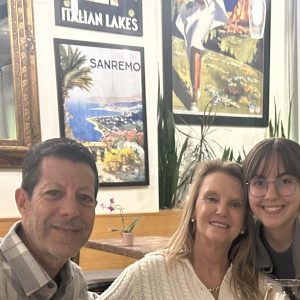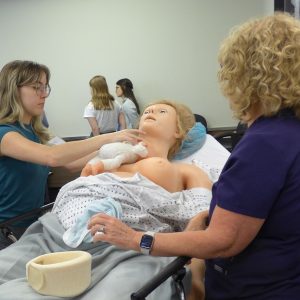Q&A: Empathy motivates MRT-TI student Katrina Fernandez on her IBCLC journey
April 30, 2024
Mary Rose Tully Training Institute (MRT-TI) student Katrina Fernandez is a second-year MPH student at UNC Gillings School of Global Public Health in the Department of Maternal and Child Health. Originally from Florida, she earned her BS from the University of Central Florida. Her research interests currently center around breastfeeding advocacy efforts, adolescent vaccination, and vaccination safety for pregnant populations. When not completing schoolwork, Katrina enjoys spending time with friends, exploring North Carolina, and visiting home when she can.
What academic experiences led you to MRT-TI and the field of lactation?

Katrina Fernandez
While completing my undergrad degree at the University of Central Florida, I had the opportunity to volunteer at a local milk bank through my professional fraternity. In this experience, I had the chance to connect with a wide array of people and families who use human milk banks. The faculty and staff I worked with during this endeavor communicated to me about their goals and aspirations for the future of the field of lactation clinically and within research, which piqued my interest. Through the families served, I was able to see firsthand the positive impacts that human milk donation and acquisition has on many. These two viewpoints sparked my interest in the field of lactation. MRT-TI is special because it allows us to grow our learning and involvement in various spaces and sectors of lactation on a local, state, and national level. When exploring my options to grow within the field, MRT-TI stood out not only because it is offered at my current graduate school, but also because I quickly realized it was a unique and impactful program, and that is what I wanted out of this experience.
What are your future career goals, and how does becoming an IBCLC contribute to them?
In the short term, my career goals involve becoming a public health analyst or becoming involved in program coordination within the maternal and child health field. Looking a bit further ahead I hope to transition into a role that will allow me to contribute to initiatives related to lactation education and access, while also evaluating their impacts on relevant communities. I have a passion for both education and evaluation. It is important to me that I be able to provide education that is engaging, available, and attainable to all. I find it equally important to take a step back and evaluate the impacts of such programmatic efforts to ensure they are being received well and are consistently equitable and relevant to the needs of various communities. Being an IBCLC plays such a vital role in these goals since it will allow me to provide an evidence-based lactation perspective incorporating lessons learned from being involved in the lived experiences of patients.
“Don’t be afraid to put yourself out there and try as much as possible.”—Katrina Fernandez
What unique perspectives do you bring to our MRT-TI cohort?
I think my experience in the vaccination and fertility healthcare field, specifically with education and advocacy, has exposed me to how misinformation and stigma spread and how it can influence a person’s decisions and/or confidence. With that, I feel I bring a unique approach to addressing questions and concerns regarding breast/chestfeeding. I recognize how important it is to navigate these conversations with empathy and to meet people where they are while also providing evidence-based information to help them make an informed decision and aid in their breastfeeding goals.
How does becoming an IBCLC intersect with your public health interests?

Katrina and her parents
My public health interests currently center around vaccinations and vaccine confidence for pregnant and postpartum birthing people and their infants. I want to use the knowledge I have acquired to investigate vaccine uptake in pregnant or breast/chestfeeding individuals and assess the factors that played a role in their decision-making. I also want to use my education and research in this content area to debunk the stigma and myths associated with receiving vaccines while pregnant or human-milk feeding.
What is something that you have learned as an MRT-TI student, whether in class or during clinicals, that surprised you?
The things I have learned while participating in clinical in-and-outpatient have surprised me the most. Having immense, firsthand insight into the various changes, transitions, and challenges that families face while breastfeeding has taught me so much. Furthermore, learning about the vital role that education plays in building a person’s confidence, feelings, and perceived ability to navigate the changes and challenges that accompany the lactation and feeding journey. These experiences have brought to light and emphasized the importance of ongoing support while also revealing the barriers to accessing resources for said support. Learning about the barriers faced by so many, when seeking lactation support and education, has also been a surprise for me.
What do you plan to contribute to the field of lactation as a future IBCLC?

Katrina with UNC Health lactation consultant Robyn Lewis during MRT-TI orientation
One area where I plan to contribute is expanding supportive and encouraging environments in community spaces and in the workplace setting to promote positive breast/chestfeeding and pumping experiences. My goal is to contribute to efforts that enhance lactation support, promote the formation of peer groups, advocate for breastfeeding-friendly policies everywhere, and create an increase in general education on breastfeeding topics. I also want to bring greater recognition to the PUMP Act among breast/chestfeeding individuals and communities. I hope to build confidence in individuals to advocate for their rights in the workplace and ensure that they have access to the accommodations they need to continue their goals. Lastly, I want to be a resource for individuals on their lactation journey no matter the phase they are in.
What has been your favorite part of participating in the MRT-TI program?
I think my favorite part is the clinical experience. Specifically, being able to be a part of every patient’s journey and hearing their stories. It motivates me to be the best version of myself and to best support them each week. It is also incredibly rewarding to see the excitement and transformation that occurs when we work together to find, and then meet mutually desired feeding goals in a supportive, collaborative, and personalized way.
What advice would you give to someone interested in training to become an IBCLC and entering the lactation field?
Don’t be afraid to put yourself out there and try as much as possible. It can be nerve-wracking at the beginning of this training journey when you are learning skills in class, and then going to apply them and be hands-on at clinicals. Going into clinical scenarios, just be confident in yourself and your knowledge because nine times out of ten, you know more than you think. It’s okay to make mistakes and to also ask for help every step of the way – it is all a part of the learning and growing journey!
Housed within the Carolina Global Breastfeeding Institute, the Mary Rose Tully Training Institute (MRT-TI) is accredited by the Commission on Accreditation of Allied Health Education Programs upon recommendation of the Lactation Education Accreditation and Approval Review Committee. In 2016, MRT-TI earned the distinction of becoming the first accredited Pathway 2 lactation consultant training program in the United States. The program is in the Department of Maternal and Child Health at UNC Chapel Hill’s Gillings School of Global Public Health.
– Brandyn D. Brown-White
